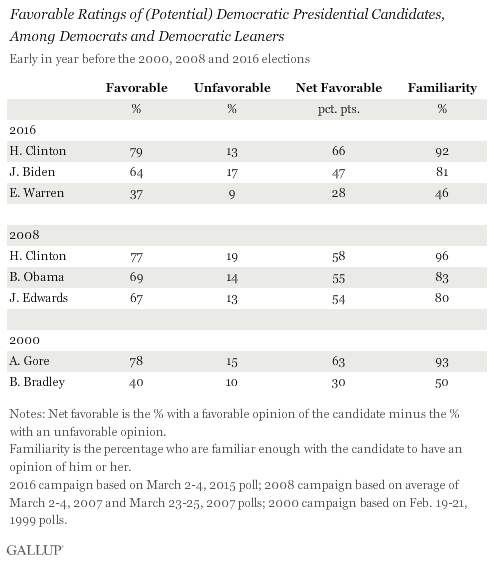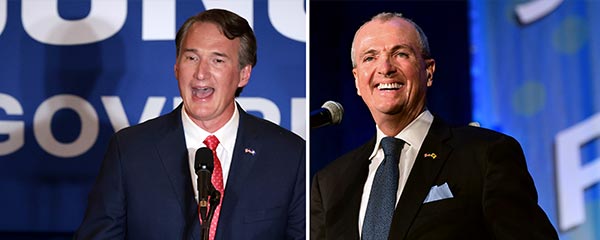Story Highlights
- Clinton +66 net favorability exceeds +58 in 2007
- Clinton has larger lead in net favorability over field than she did in 2007
- Clinton numbers similar to Gore's in 1999
PRINCETON, N.J. -- Hillary Clinton's net favorability rating among Democrats -- defined as the percentage who have a favorable opinion of her minus the percentage with an unfavorable opinion -- is higher now than at a similar point leading up to the 2008 presidential election. Her net favorability is also similar to Al Gore's rating early on in the 2000 presidential campaign. The current Democratic field does not appear to present as much competition for Clinton as she faced in 2008.

Besides her lead in favorability ratings over her potential 2016 rivals, Clinton also enjoys an advantage in familiarity over her competition. Ninety-two percent of Democrats know Clinton well enough to have an opinion of her, compared with 81% for Joe Biden and 46% for Elizabeth Warren. Clinton's current level of familiarity is similar to her 96% familiarity before the 2008 campaign and to Gore's 93% in early 1999.
These results on the potential 2016 Democratic candidates are based on a March 2-4 Gallup poll. That poll was conducted as Clinton was being criticized for use of a private email account to conduct official business as secretary of state, but before she publicly addressed the issue.
Gallup has measured Americans' opinions of potential and announced presidential candidates since 1992 to assess whether the public views each favorably, unfavorably or does not have an opinion either way. Ratings from early in the year before the election, compared with the current stage of the 2016 election process, are available for the 2000 and 2008 elections. Those two elections are arguably the most relevant to the coming election because they did not include an incumbent president in the candidate field.
National polls show Clinton the clear leader when Democrats and Democratic-leaning independents are asked to say which of the potential 2016 Democratic candidates they are most likely to support for the nomination. Clinton also had a significant lead over her rivals in 2007 on the same measure. But Clinton may have been more vulnerable in the 2008 campaign than her early lead on the nomination ballot implied because Democrats viewed her major competitors -- Barack Obama (+55 net favorable) and John Edwards (+54) -- nearly as favorably as they viewed Clinton (+58).
Clinton had near-universal recognition among Democrats in March 2007 -- 96% were familiar enough with her to have an opinion -- but Obama and Edwards were familiar to at least eight in 10 Democrats.
At this point, the indications are Clinton will officially announce her 2016 candidacy next month. What is not clear is whether she will have a formidable challenger for the Democratic nomination. Biden and Warren appear to be her most serious potential challengers, but both currently trail Clinton by significant margins on net favorability and familiarity among Democrats.
Given her better net favorable ratings now than in 2007 and her bigger lead on that measure over her closer competitors than before the last campaign, Clinton would start out the 2016 campaign in a more advantageous position than she did in 2008, even though she was the presumed front-runner both times.
Another auspicious sign for Clinton is that her current standing is similar to Al Gore's in the 2000 campaign. Gore was the sitting vice president and the odds-on favorite for the nomination. Former New Jersey senator Bill Bradley challenged Gore for the nomination, but he was far behind Gore early on in net favorability ratings (+30 to +63). He also faced a 43-percentage-point deficit on familiarity, as 93% knew Gore well enough to have an opinion him, compared with 50% for Bradley. Bradley failed to win a single primary or caucus that year.
Should Biden decide to run, Clinton would not be in as strong a position relative to her competition as Gore was in February 1999. Biden's current familiarity and favorability scores are better than Bradley's were at a comparable point in the 2000 campaign.
If Warren decides to run but Biden stays out of the race, the 2016 Democratic nomination campaign may look remarkably like the 2000 campaign at the outset. Warren's net favorable and familiarity scores are essentially the same as Bradley's in early 1999, meaning she would have to overcome a similar deficit to the front-runner that Bradley faced.
To date, Biden has not indicated whether he will seek the nomination. Warren, despite many entreaties to get into the race, has said she will not seek the nomination. Other potential challengers who have given stronger signals they may run -- including former Maryland governor Martin O'Malley, Vermont Sen. Bernie Sanders and former Virginia Sen. Jim Webb -- are largely unknown to rank-and-file Democrats, and not viewed particularly positively among those who are familiar with them. That certainly could change if any enter the race and become viewed as credible challengers to Clinton, but each would have even more ground to make up on Clinton than would Warren or Biden.
Implications
As was the case eight years ago, most political experts have dubbed Hillary Clinton as the clear front-runner for the Democratic presidential nomination. Obviously, similar predictions did not pan out in 2008 as Clinton lost a spirited nomination contest to Obama. But Clinton appears to be in an even stronger position compared with her potential challengers than eight years ago, given clear advantages in both familiarity and favorability. And if Biden decides not to run and no other prominent Democrat unexpectedly gets into the race, Clinton's current positioning would be at least as strong as Al Gore's was before the 2000 campaign, and possibly stronger depending on which Democratic politicians might challenge her.
As in 2000, the Democratic nomination contest may offer little drama if Clinton has a relatively clear path to the nomination. Having a clear path could benefit Clinton, helping her keep a consistent ideological message in the campaign's nomination and general election phases rather than pivoting to the left if a more conservative Democrat challenges her or to the right if a more liberal one challenges her in the primaries. Without serious primary opposition, Clinton could avoid any criticisms of her record, qualifications or positions from her party. She would also have more time to raise money for the general election campaign and make her appeal to the broader electorate than to mainly Democrats.
On the downside, without a serious challenger, she would have less opportunity to hone her messages on the campaign trail and in debates. Further, if the Republican nomination contest is highly competitive, Clinton and the Democrats might struggle to get media attention while the GOP battle plays out. Also, any potential attacks on Clinton's record later in the campaign could harm her standing because the earlier these criticisms occur, the more quickly she can address and move past them.
Survey Methods
Results for this Gallup poll are based on telephone interviews conducted March 2-4, 2015, on the Gallup U.S. Daily survey, with a random sample of 649 Democrats and Democratic-leaning independents, aged 18 and older, living in all 50 U.S. states and the District of Columbia. For results based on the total sample of Democrats, the margin of sampling error is ±5 percentage points at the 95% confidence level. All reported margins of sampling error include computed design effects for weighting.
Each sample of national adults includes a minimum quota of 50% cellphone respondents and 50% landline respondents, with additional minimum quotas by time zone within region. Landline and cellular telephone numbers are selected using random-digit-dial methods.
Learn more about how Gallup Poll Social Series works.

